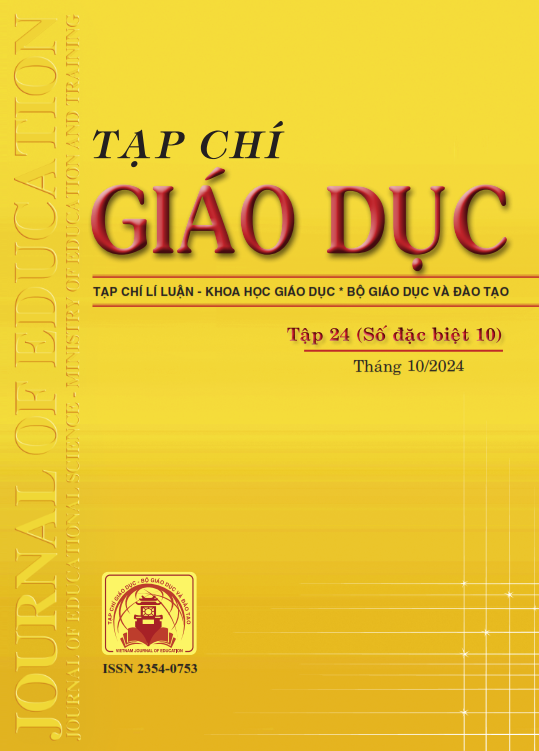Các yếu tố ảnh hưởng đến việc áp dụng mô hình học tập kết hợp đối với các học phần tiếng Anh: Nghiên cứu tại Học viện Chính sách và Phát triển
Tóm tắt
In modern education, integrating information technology into the teaching process has become an important factor in improving the quality of learning. The Academy of Policy and Development is trying to apply the blended learning model to improve the effectiveness of teaching and learning while optimizing the combination of online learning and traditional learning. This paper focuses on applying blended learning in English courses at the Academy of Policy and Development. The study uses data analysis methods from surveys and interviews with 278 students, interviews with 12 teachers of the Academy of Policy and Development and 10 education experts to collect information for analysis. The research results show that some key factors affecting the successful application of the blended learning model include: Supporting and updating of technology infrastructure; improving lecturers’ competence; Encouraging students to participate in blended learning; and School support with appropriate policies to implement blended learning models effectively.
Tài liệu tham khảo
Alten, D. C., Phielix, C., Janssen, J., & Kester, L. (2019). Effects of flipping the classroom on learning outcomes and satisfaction: A meta-analysis. Educational Research Review, 28. https://doi.org/10.1016/j.edurev.2019.05.003
Amro, F., & Borup, J. (2019). Exploring Blended Teacher Roles and Obstacles to Success When Using Personalized Learning Software. Journal of Online Learning Research, 5(3), 229-250.
Anderson, T., & Dron, J. (2011). Three generations of distance education pedagogy. The International Review of Research in Open and Distributed Learning, 12(3), 80-97. https://doi.org/10.19173/irrodl.v12i3.890
Anggawirya, A. M., Prihandoko, L. A., & Rahman, F. (2021). Teacher’s role on teaching English during Pandemic in a blended classroom. Proceedings of the International Joined Conference on Social Science (ICSS 2021). Atlantis Press.
Bersin, J. (2004). The Blended Learning Book: Best Practices, Proven Methodologies, and Lessons Learned. John Wiley & Sons.
Bộ GD-ĐT (2016). Thông tư số 12/2016/TT-BGDĐT ngày 22/4/2016 quy định ứng dụng công nghệ thông tin trong quản lí, tổ chức đào tạo qua mạng.
Bộ GD-ĐT (2021a). Thông tư số 08/2021/TT-BGDĐT ngày 18/3/2021 ban hành quy chế đào tạo trình độ đại học.
Bộ GD-ĐT (2021b). Thông tư số 09/2021/TT-BGDĐT ngày 30/3/2021 quy định về quản lí và tổ chức dạy học trực tuyến trong cơ sở giáo dục phổ thông và cơ sở giáo dục thường xuyên.
Collins, A., & Halverson, R. (2009). Rethinking Education in the Age of Technology: The Digital Revolution and Schooling in America. Teachers College Press.
Hoang, N. T. (2015). EFL Teachers’ Perception and Experiences of Blended Learning in a Vietnamese University. Doctorate Thesis, Queensland University of Technology.
Lam, J. (2015). Collaborative Learning Using Social Media Tools in a Blended Learning Course. In: Cheung, S., Kwok, Lf., Yang, H., Fong, J., Kwan, R. (eds) Hybrid Learning: Innovation in Educational Practices. Springer, Cham. https://doi.org/10.1007/978-3-319-20621-9_15
Maghfiroh, A., Unaiziah, E. a. N., Mustikawati, D. A., & Susilowati, T. (2024). Students’ English Learning Strategies Assisted with e-Resources in Blended Learning. Journal of Languages and Language Teaching, 12(1), 535. https://doi.org/10.33394/jollt.v12i1.9530
Mawdudur, R., & Mahmud, N. (2013). Blended Learning: An Emerging Culture in Higher Education. Knowledge Globalization Conference 2013, Istanbul, Turkey.
Mosha, N. F. V., & Luhanga, E. T. (2023). The Application of Online and Blended Learning During Outbreaks, Epidemics and Pandemics: The Case of Higher Education Institutions (HEIs). In: Sengupta, E. (Ed.) Pandemic Pedagogy: Preparedness in Uncertain Times(Innovations in Higher Education Teaching and Learning, Vol. 49), Emerald Publishing Limited, Leeds, pp. 147-161. https://doi.org/10.1108/S2055-364120230000049009
Nguyễn Thị Bạch Tuyết (2021). Nghiên cứu thực trạng sử dụng công nghệ thông tin phục vụ giảng dạy trực tuyến. Hội thảo Khoa học Quốc gia “Ứng dụng Công nghệ thông tin trong đổi mới phương pháp giảng dạy theo định hướng Blended Learning”. Viện Công nghệ thông tin & Kinh tế số, Trường Đại học Kinh tế Quốc dân.
Nguyen, T. L., & Nguye, V. H. (2020). A Structural Equation Model of Blended Learning Culture in the Classroom. International Journal of Higher Education, 9(4), 99-115. https://doi.org/10.5430/ijhe.v9n4p99
Pima, J. M., Odetayo, M., Iqbal, R., & Sedoyeka, E. (2016). Investigating the available ICT infrastructure for collaborative web technologies in blended learning in Tanzania: A mixed methods research. The International Journal of Education and Development using Information and Communication Technology, 12(1), 35-52.
Prasetya, N. L. (2020). A Correlation Analysis of Student's Socioeconomic Background, Internet Habits, Familiarity, and Comfortability with Technology, Learning Engagement, and Academic Performance in a Blended Learning Environment at an Indonesian Medical School. Master of Medical Sciences in Medical Education, Harvard Medical School.
Yuping, W., Xibin, H., & Juan, Y. (2015). Revisiting the Blended Learning Literature: Using a Complex Adaptive Systems Framework. Educational Technology & Society, 18(2), 380-393.
Zhu, Z., & Hu, J. (2021). Technology empowers educational innovation in the later stage of the epidemic: A new form of online and offline integrated teaching (in Chinese). Open Education Research, 1, 13-23.
Đã Xuất bản
Cách trích dẫn
Số
Chuyên mục
Giấy phép

Tác phẩm này được cấp phép theo Ghi nhận tác giả của Creative Commons Giấy phép quốc tế 4.0 .












